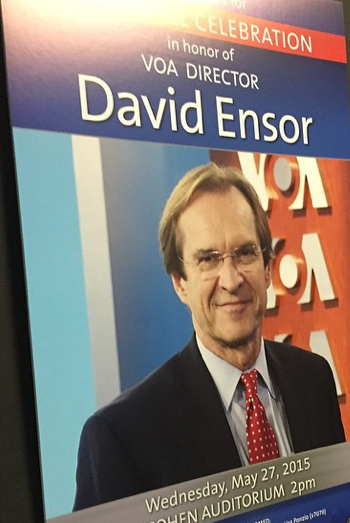BBG Watch Exclusive Commentary
According to several Voice of America (VOA) journalists who attended a meeting last week with VOA director David Ensor shortly before he left office, Mr. Ensor issued a blunt warning to Broadcasting Board of Governors’ (BBG) freedom media outlets, which include Radio Free Europe / Radio Liberty (RFE/RL) and Radio Free Asia (RFA), to refrain from trying to get the backing of Congress at the expense of Voice of America.
“Stop telling politicians to put us [VOA] in a little lane that would kill us off because I’m going to come to kill you if you do that,” David Ensor was quoted as saying. “We’re all going to make arguments. You haven’t got clean hands.” he reportedly said.
In his statement about putting VOA “on a little lane,” Mr. Ensor was apparently referring to some of the provisions of the bipartisan BBG reform bill, H.R. 2323,the United States International Communications Reform Act, which direct VOA do implement all three parts of the VOA Charter with a particular emphasis on U.S. news. Mr. Ensor apparently interprets these H.R. 2323 provisions as preventing VOA from reporting international and local foreign news.
Republicans and Democrats on the Hill are believed to have put these reform provisions in H.R. 2323 because of their concerns that the Voice of America does not sufficiently report on U.S. news while at times duplicating the work of Radio Free Europe / Radio Liberty and Radio Free Asia in reporting local foreign news in greater detail than it may be necessary or required by the VOA Charter.
“I say to my friends at the Radio Frees [Radio Free Europe / Radio Liberty and Radio Free Asia], don’t attack us and try to put us in this little narrow lane to kill us off, because if you do, I’m going to point out how much money, how much rent you are paying on M Street or on Connecticut Avenue [Washington offices of RFE/RL and RFA],“ VOA journalists quoted David Ensor as saying in a meeting last week.
David Ensor reportedly said “instead, let us be reasonable and honest about what it is we do.”
“We do what the audience wants us to do,” David Ensor was quoted as saying.
During Mr. Ensor’s tenure, VOA expanded placement of programs on local stations. Some of these placement programs do not include news and may be pre-censored by VOA to avoid content which may be otherwise objectionable to station owners, governments and audiences in certain countries. U.S. taxpayers pay for some of these placement programs to be put on the air. Much of the audience growth during David Ensor’s tenure is believed to be due to new VOA program placement, often in countries that already have free media, such as Mexico.
If we don’t do what the audience wants us to do,”we’re dead,” Mr. Ensor was quoted as saying.
The operating U.S. law, the VOA Charter, however, does not refer to what the audience may or may not want from VOA, especially not as determined by local gatekeepers.
A gatekeeper may be a business television network in Russia that will take only a business news report from VOA but will not take a political news report highly critical of President Putin.
While VOA may deliver more controversial content through other platforms, (where its audience engagement numbers for VOA through social media are dismal compared to Russia’s RT or BBC, critics point out), BBG’s media freedom outlets are less likely to agree to such compromises with local gatekeepers.
Representatives of BBG’s media freedom outlets have explained on previous occasions that it was the U.S. Congress that decided where their various offices should be located because lawmakers thought it would make them more effective and save money.
Some members of Congress and congressional staffers took note of Voice of America director David Ensors’ earlier public comments which they interpreted as inappropriate lobbying against pending legislation while he was still in office. Congressional sources told BBG Watch that in their view Mr. Ensor used taxpayers’ money and government facilities to express his opposition to potential legislative actions — something ordinary taxpayers have to do at their own expense if they disagree with a particular bill.
In a “FAREWELL” post on his official Voice of America blog, VOA director David Ensor critized members of Congress for what he described as “ill-conceived legislative and internal reform proposals.”
“VOA has also had to defend itself from sometimes ill-conceived legislative and internal reform proposals” and “we also know that if VOA were ever to be limited by law to just covering U.S. news, many of our key audiences would turn elsewhere for information they currently get from us,” David Ensor wrote in his farewell official blog post.
In his talk with the staff last week David Ensor said that he will join former Voice of America deputy director Alan Heil in lobbying against parts of the bipartisan H.R. 2323 legislation with which they both disagree, but we can report that some people on the Hill were put off by David Ensor’s comments and may be less inclined to take positions favorable to VOA after reading Mr. Ensor’s statement.

Comments are closed.